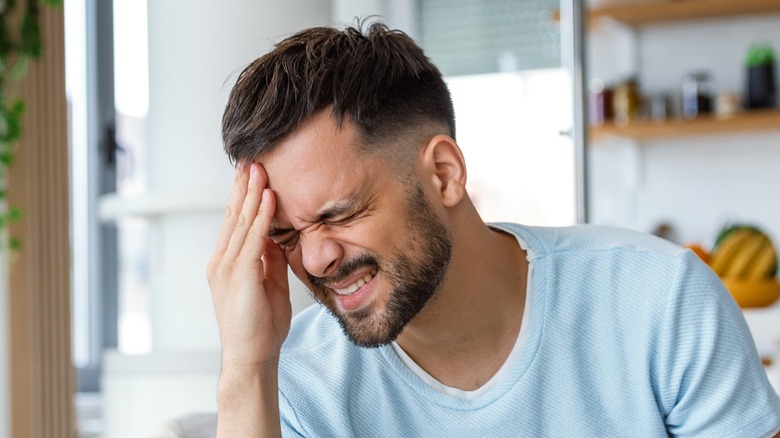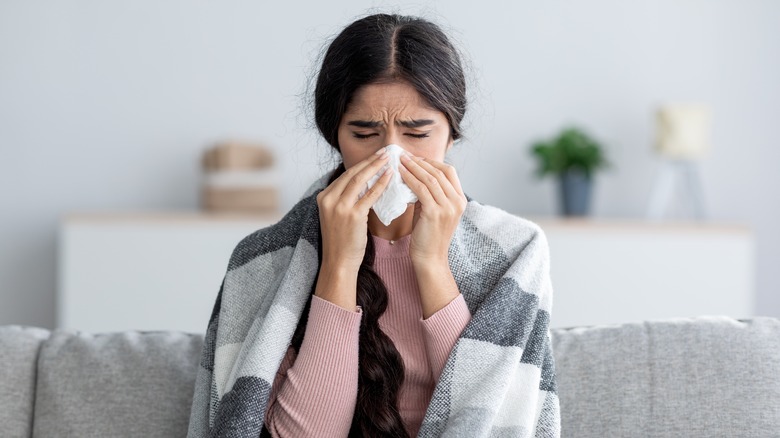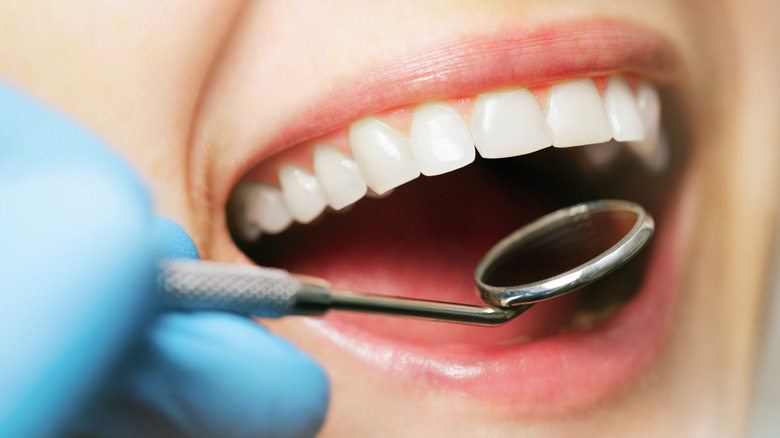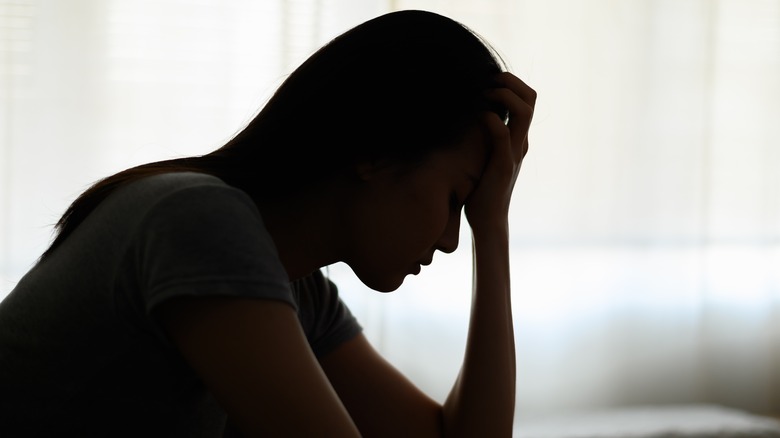What Happens To Your Body When You Suddenly Stop Drinking Coffee
If you drink coffee regularly, you're not alone. According to a 2016 study in The Journal of Nutrition, roughly three-quarters of adults living in the United States who are more than 20 years old are reported coffee drinkers. This translates to approximately 154 million people, of whom almost half consume coffee every day. Coffee is a pick-me-up for many individuals due to the fact that it contains caffeine, a stimulant (via Cleveland Clinic).
There is some conflicting information on whether or not one can become addicted to caffeine. For example, a press release about a 2004 study states that "as little as one standard cup of coffee a day can produce caffeine addiction" (via Johns Hopkins Medicine). And yet, the Cleveland Clinic says that what your body develops isn't so much a caffeine addiction as it is a caffeine dependence. With that said, both sites agree that cutting caffeine can cause caffeine withdrawal.
If you want to give up coffee, the Cleveland Clinic recommends gradually decreasing your coffee intake. In fact, the Clinic cautions against "mak[ing] the mistake of stopping [caffeine] totally," since that increases the chances of withdrawal. You can also speak with a healthcare professional about your coffee consumption and ways to reduce how much coffee you drink. Keep reading to learn more about caffeine withdrawal, as well as other possible ways suddenly stopping drinking coffee might impact your health.
You might get headaches
If you do an Internet search for "caffeine" and "headaches," you'll probably find some conflicting information about whether caffeine helps remedy headaches or causes them. But once you understand how caffeine affects blood vessels, caffeine's connection to headaches becomes clearer.
According to the Mayo Clinic, when a headache takes place, "blood vessels swell, tighten or go through other changes, causing an increase in blood flow around the brain." Since caffeine can cause those blood vessels to become narrower, that can reduce the amount of blood flowing, and in the process, could reduce headache pain. And while it's sometimes recommended to take pain killers and caffeine together, constantly consuming caffeine and then cutting it out altogether can result in more blood flow and caffeine withdrawal headaches — the kind that might not go away for up to two weeks.
The bottom line is that giving up coffee cold turkey could trigger caffeine withdrawal headaches. In addition, neurologist Dr. Nicole Clark told the American Medical Association that while caffeine might be a beneficial treatment for some headache and migraine patients, consuming too much of it can also lead to headaches. Regardless of what might be triggering your headaches, if you frequently experience them, speak with a medical professional who can help you figure out what's causing them and set a treatment plan for you.
You could feel like you have the flu
Imagine this: A friend of yours, Amanda, gives up coffee. It doesn't take long before she begins feeling sick, as if she has the flu. Since it's flu season, she decides to go to the pharmacy to buy some over-the-counter medication. But there's a good chance that what Amanda is experiencing isn't really the flu, but caffeine withdrawal.
According to MedicineNet, when someone goes through caffeine withdrawal, they can sometimes experience muscle pain, nausea, and vomiting, all of which can also be signs of influenza. In fact, muscle pain and caffeine withdrawal often go hand in hand. It's also possible to have a stuffy nose because of caffeine withdrawal (via Ohio State University Wexner Medical Center). It's worth noting that having flu-like symptoms because of caffeine withdrawal is considered a more severe reaction to cutting out coffee. Although there are medications that can help with symptoms like nausea and vomiting (via MedicineNet), Amanda's second mistake was not seeing a medical professional when she began experiencing flu-like symptoms (whom she should also inform about her recent decision to give up coffee).
Per the Ohio State University Wexner Medical Center, a person who experiences a severe reaction to quitting caffeine cold turkey might want to try a blend of caffeinated and decaffeinated coffee as part of a gradual approach, as opposed to abruptly stopping their caffeine consumption.
You might experience hand tremors
It's not uncommon in entertainment (especially comedies) to show a person has drunk too much coffee by having them shake involuntarily. Interestingly, this visual is actually based on reality, though tremors don't only occur because of too much caffeine.
According to Business Insider, it's possible for someone experiencing caffeine withdrawal to have their hands shake uncontrollably. However, integrative physician Dr. Don Raden told Prevention that such tremors aren't a common sign of caffeine withdrawal. We're also not sure at this time why these tremors can occur. With that said, we do know that caffeine can affect the brain, and that issues in sections of the brain related to motor functions can in turn lead to tremors. But even though more research is needed, Dr. Raden notes that for most people, this caffeine withdrawal-related shaking usually subsides in a matter of days.
While caffeine withdrawal can be the culprit behind hand tremors, high amounts of caffeine can also cause them (via WebMD). Harvard notes that there is more than one type of tremor, with caffeine use specifically associated with enhanced physiologic tremors. While a physiologic tremor is less severe (to the point that you might not even see it happening), an enhanced physiologic tremor is definitely more noticeable (via NewYork-Presbyterian). Essentially, both too much caffeine and caffeine withdrawal can make your hands shake. So, if you're giving up coffee, try not to become discouraged if those tremors don't immediately go away.
Your oral health could improve
As WebMD notes, drinking coffee can lead to stains on one's teeth. Of course, giving up coffee altogether rather than gradually reducing the amount of coffee one drinks will probably lead to faster (but not instant) results regarding one's smile. With that said, there are ways to take a step-down approach to coffee drinking while still helping to minimize coffee's potential negative impact on one's teeth.
According to Smile Team Orthodontics, there are pores in our teeth's enamel. Coffee contains tannins, which can get into those pores. This explains not only why coffee can stain teeth, but also why those stains are deep ones. In addition, while enamel is very strong, the acidic nature of coffee can eat away at it. This can also make one's teeth more susceptible to staining. As WebMD explains, bacteria can lead to tooth decay, and our saliva protects our mouths from bacteria. But the caffeine in coffee actually reduces the amount of saliva in one's mouth, increasing the likelihood of developing oral health problems.
To be fair, coffee isn't entirely bad for one's teeth. Smile Team Orthodontics states that the antioxidants in coffee can be beneficial for both the teeth and the gums. But if you still want to give up that cup of joe gradually, try drinking coffee through a straw and rinsing your mouth with water.
It could affect your urination and bowel movements
If you notice that you seem to make more frequent bathroom visits after drinking coffee, that's not a coincidence. According to St. Joseph's Healthcare Hamilton, the caffeine in your coffee is a diuretic, which is why you might be finding yourself urinating more. Plus, caffeine can be the culprit behind urge incontinence. This is when someone suddenly feels like they have to go and might have trouble making it in time to a restroom, via MedlinePlus. So, cutting out coffee could change how often you need to urinate.
Besides possibly affecting urination, coffee could also impact one's bowel movements. As the Cleveland Clinic explains, muscle contractions are how one moves waste material through their bowels. However, a study in the Journal of Clinical Gastroenterology found that acids found in coffee can encourage bowel movements. In addition, integrative physician Dr. Don Raden told Prevention that caffeine "has been proven to stimulate bowel movements so going off of caffeine suddenly can cause constipation."
If you would like to cut back on coffee but are concerned about constipation, Dr. Raden recommends keeping yourself properly hydrated and incorporating more green leafy vegetables and fiber-rich foods into your diet. Business Insider notes that whole grains and beans are excellent sources of fiber. Lastly, maintaining a regular exercise schedule can also be beneficial for one's bowel movements.
It could affect your sleep
As The Insomnia Clinic notes, caffeine is a stimulant, and so drinking coffee around bedtime can interfere with getting a good night's sleep. But while avoiding caffeine before you turn in might increase the chances of a restful night's sleep, cutting caffeine in general might also contribute to sleep problems.
In the long run, giving up caffeine can be helpful for getting a good night's sleep, especially depending on when you consume it during a 24-hour period (via Business Insider). With that said, The Insomnia Clinic warns removing caffeine from your diet is not a cure-all for insomnia, even though it is often suggested to patients with sleep problems. As integrative physician Dr. Don Raden told Prevention, "Ironically, cutting down on caffeine too quickly can disrupt sleep the same way consuming too much caffeine does."
According to Raden, your sleep cycle may need up to two weeks before it can go back to normal. Potentially having two weeks of poor sleep can be enough to discourage someone from giving up caffeine. Additionally, giving up caffeine can lead to the person feeling more tired during the day. Thus, it might be wise to start reducing your caffeine intake during a week when you'll have enough time to get some proper sleep.
It might impact depression
As MedicineNet explains, the caffeine in coffee can affect the drinker's mood. With regard to depression, however, caffeine has been said to have both positive and negative potential effects.
On the one hand, there is research supporting the idea that caffeine in certain amounts might lower the chances of developing mental health disorders. Studies have found that the higher caffeine content in coffee yields better results in this area compared to that of tea. Moreover, coffee also contains chlorogenic, ferulic, and caffeic acids, which might be beneficial for someone with depression. Nerve cells can become inflamed in depression patients; these acids might help with this inflammation. Conversely, there is also research suggesting that caffeine can worsen depression, especially for patients with mood disorder who get panic attacks. Caffeine might lower serotonin and increase dopamine, both of which could be factors in depression. Lastly, large amounts of coffee could result in inflammation.
If you begin to experience what feels like depression after either drinking coffee or giving it up completely, don't try to self-diagnose. Instead, consult a medical professional and tell them about your symptoms, as well as any recent changes you've made to your regular caffeine intake.
If you or someone you know needs help with mental health, please contact the Crisis Text Line by texting HOME to 741741, call the National Alliance on Mental Illness helpline at 1-800-950-NAMI (6264), or visit the National Institute of Mental Health website.








